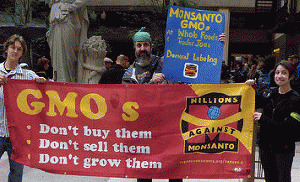
Chicago Millions Against Monsanto World Food Day 2011
(Image by MillionsAgainstMonsanto) Details DMCA
In August of 2014, the website Gawker revealed documents that demonstrated the lengths to which the global chemical giant Monsanto would go in order to control the narrative about their products - in particular, their genetically modified crops. At a minimum, Monsanto enlisted Conde Nast publications, and appealed to non-governmental organizations (NGOs) in need of donations, to help produce a celebrity-driven video series in support of genetically modified organisms (GMOs). While we all like to believe that our scientific/rational brains see through the transparent marketing, public relations rhetoric exists because it greatly sedates critical thought.
Although the proposed campaign by Monsanto never materialized, a quick perusing of GMO articles over the past year elicits suspicion that Monsanto's and Conde Nast's relationship did not end. In addition, Monsanto almost certainly had its hand in a number of other propaganda ventures. Since last year, the pro-GMO rhetoric has increased tremendously in news media articles on genetically modified organisms. Recent disclosed documents have also exposed numerous scientific experts enlisted in Monsanto's messaging. But what is most pernicious is that a whole new rhetorical talking point has come to the forefront, which threatens anyone -- particularly scientists - who speak out against their "tent pole" technology: If you are anti-GMOs you are anti-science.
The new talking point represents a brilliant strategy to promote genetic engineering. Most people do not want to be characterized as anti-science, not journalists, not public officials, not celebrities, and least of all, not trained and educated scientists. Furthermore, the propaganda plays to pro-science liberals who have accused conservatives of being anti-science due to their denial of climate change.
Unlike anthropogenic climate change, though, there is absolutely no scientific consensus on the safety of GMOs. In fact, each and every new GMO needs to be fully tested individually for its safety, because each genetic modification confers a not only a novel gene into the genome, but also a possible genetic interaction within the genome. The notion that one gene always only controls one trait is known to be far too simplistic. Often, many genes function in concert to produce traits, and sections of DNA can also turn traits on or off. Therefore, inserting novel genes into DNA sequences may affect untargeted traits in unpredictable ways.
Additionally, most GMOs are not tested for safety. Not only does federal policy unscientifically delegate GMO crops as "substantially equivalent" to conventional crops, independent research on environmental effects and health effects (via animal feeding studies) is hampered by industry in a large part due to patents preventing the study and use of GM seeds and crops. Feeding studies that have occurred, most of which have been funded by industry, have been mired with problems such as contaminated feed and methodological corruption that render their results invalid.
To be sure, we need only go back to 2000 to recognize that every GMO is different and that not all are safe to be eaten. That year the genetically engineered "StarLink" corn -- not approved for human consumption -- was recalled after it was found in corn products and may have resulted in scores of adverse human health effects.
So why have we fallen for the distortion that concern about GMOs is indicative of one's lack of scientific knowledge? Because a select group of scientists and media have told us so. Even Jon Stewart fell for the simplistic propaganda in a segment that aired April 22, 2015 on the Daily Show. In it, he had a pro-GMO agricultural scientist pitted against an anti-GMO activist. Who do you suppose came off as more trustworthy and reliable? Despite presenting a seemingly balanced report, Stewart's show favored the view of those who produce these products over those who study the effects of these products. What needs to be elucidated when talking about controversial technological risks is what kind of scientist has a voice and what kind does not.
Research has shown that upstream scientists -- such as biotechnologists, agricultural technicians, or any scientists who create technologies -- carry far less concern for potential risks than do downstream scientists -- such as public health practitioners, epidemiologists, and environmental toxicologists. Where was the voice of the downstream scientist on the Daily Show? I've worked with biotechnologists personally who have expressed to me that they do not even consider risk or unintended consequences of GM technology. I also sat in a toxicology class where an upstream scientist said that he and his colleagues could never have imagined the rapid and prolific emergence of superweeds in response to Monsanto's glyphosate-resistant GM crops (and the copious use of glyphosate). Meanwhile, environmentalists immediately and fully predicted the resultant herbicide-resistant superweeds that these agricultural experts did not.
Jon Stewart's report on GMOs also noted the recent Pew poll that showed 88% of scientists - represented by members of American Association for the Advancement of Science (AAAS) -- believe that GMOs are safe. What neither Stewart nor Pew mentioned is how many of those scientists are well-versed on the issue of GM technology. Though they were launched into the American food supply in the early 1990s, most of the public and scientists alike, specifically scientists with expertise in entirely different fields, knew little to nothing about GMOs prior to 2008. It was that year that the documentary "Food Inc." introduced Americans to what Europeans and others around the world already knew about GM technology. Indeed, the E.U and other nations had already banned GMOs under the precautionary principle policy, and most European nations now faced with Monsanto's global market propagation are still choosing to ban the technology.
Perhaps 20% of the scientists in the Pew poll work directly or indirectly on GM technology -- either upstream of downstream. But science, like every other industry, is a social structure. For career purposes and in order to maintain ties to the larger community, scientists tend to support other scientists -- especially the scientists who have the money and prestige. The scientists with money and prestige are largely upstream scientists. Upstream scientists are not threatened, discredited, defamed, and scrutinized the way downstream scientists are. Downstream scientists have to produce immaculate, indisputably rigorous research -- and even when they do they are questioned by the ubiquitous industrial PR machine. Downstream scientists are not a large part of the community.
Consequently, let's examine that aforementioned Pew poll more closely: The 11% of scientists who do not agree that GMOs are safe are likely the downstream scientists who have studied or attempted to study their effects. It may be that ~ 10% of scientists who think GMOs are safe actually cultivate the technology. It may be that the other 78% who agree about GMO safety may or may not have a great deal of knowledge about GMOs, but rather take the word of their esteemed colleagues. In fact, as Ralph Nader recently mentioned, three former presidents of AAAS have ties to Monsanto and/or the biotech industry. Upstream scientists who produce biotechnology and the AAAS are not unbiased sources of information, regardless of whether or not we wish they were.
At the heart of this new rhetoric by Monsanto is the popularity of technology and the status of science in our society. However, science and technology are not equivalent. Science is the systematized study of knowledge, while technology merely applies that knowledge -- for good or for ill. Science and technology are all too often conflated both by the public and by scientists themselves. It cannot be overstated that upstream technological scientists are prioritized and favored while downstream toxicologists and the like are continuously monitored and intimidated because they threaten industry. (See Drs. Tyrone Hayes, Ignatio Chapela, and Gilles-Ã"degreesric Seralini for just a few well-know examples of attacks on downstream scientists.) While downstream science, which may point out frightening truths about risks, can be unpleasant, upstream science is often full of the wonder and excitement of technology. The conflation of science and technology has been exploited by the GMO industry to support the acceptance of their products under the guise of scientific authority.
There is a great history of scientific acceptance of and agreement about controversial technologies, with tremendous detrimental effects. Alleged scientific consensus touted the safety of hormone replacement therapy, DDT, DES, indiscriminate use of x-ray radiation, benzene, asbestos, BPA, and cigarette smoking. The work of the late Theo Colborn, one of the first downstream scientists to discover the risk of synthetic endocrine disrupting chemicals (which are now overwhelmingly acknowledged to be a tremendous public health problem), was as recently as a decade ago derided as junk or pseudo science.
This week, the U.S. Senate is poised to vote on legislation impeding the public from ever knowing about the GMOs in their food. Already passed in the House of Representatives as H.R. 1599, the so-called (by food advocacy groups) "DARK (Deny Americans the Right to Know) Act" would ban the labeling of GMOs in our food supply. As per custom with industry and the government who serves it, this act has the official Orwellian misnomer of the "Safe and Accurate Food Labeling Act," even though the bill is neither.
Learning from these historical scientific errors in judgment, we should not be bullied into blindly accepting a controversial technology. As of now, GMOs do nothing for society but enlarge the coffers of the billion-dollar agrichemical giants who produce them. They have not alleviated hunger, they have not increased environmental sustainability; their much-hyped public benefits have not yet materialized. To question their scientific and societal value -- and risk -- is decidedly scientific at its core. At the very least, the public has a right to know what is in the food they eat. Anything else would be an infringement on the rights of all U.S. citizens and most of all, would be in itself anti-science.
(Article changed on October 4, 2015 at 10:49)





